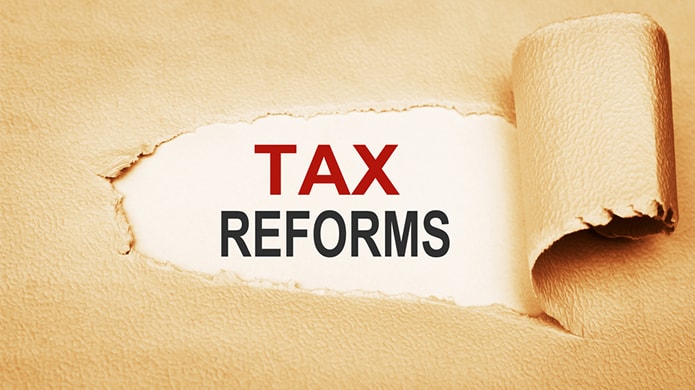What does the future hold for the buy-to-let market?
02-26-2017

Over the past two decades, investing in buy-to-let has been a relatively easy way to make money, which is why so many people would rather supplement their income or grow their wealth through property than shares or cash.
But after 20 years, tax changes mean buy-to-let will no longer deliver the returns it did, and yet investment in the sector continues to pick up following a temporary lull in activity immediately after the introduction in April 2016 of the 3% stamp duty surcharge on additional homes, despite the fact that the tax increase has hit landlords hardest.
The Treasury collected 18% more stamp duty from the sale of residential properties last year than in 2015, pushed up by purchases made by buy-to-let investors, further illustrating the fact that they appear to be undeterred by the 3% tax hike in April.
The total stamp duty take last year was £8.28bn; without the introduction of the 3% surcharge on additional homes, receipts would have been down year-on-year.
Around 20% of all properties acquired in the last six months of the year were additional homes, and this raised £962m for the Treasury's coffers, representing 21% of the tax take during this period.
This amount was actually higher than predicted by the Office for Budget Responsibility, which had forecast £660m for the 2016-17 financial year.

Since extra stamp duty on second homes, including buy-to-let properties, came into play almost 11 months ago, the Treasury has taken more than £1.2bn of taxes from this group of buyers.
But while this has proved profitable for the Treasury, it has done little to create what the former chancellor George Osborne said would create a “level playing field” between homeowners – especially first-time buyers - and investors.
Nick Leeming, chairman of Jackson-Stops & Staff, said: “The data suggest that buy-to-let investors are not being deterred by the new tax, which is supposed to be dampening demand from this group to the benefit of first-time buyers.”
But the biggest challenge for buy-to-let landlords is yet to come.
Tax relief changes
Many people feel anxious and uncomfortable when getting themselves into debt and understandably this is why many of us strive to pay off our mortgages as quickly as possible. But financially, this is not always the best decision when long-term debt is used as a tool to create wealth.
For many landlords, effective use of gearing has been the key to getting the most from their buy-to-let properties, as the interest element of their mortgages - and remember many buy-to-let investors have interest-only deals - has always qualified for tax relief, and so paying it off has not been quite so attractive, not when the rental profit and home equity could potentially be used to acquire more investment properties.
But of course, that is all about change.

The existing rules that permit landlords to offset all of their mortgage interest against tax will, from this April, be phased out over the next three years until 2020/21.
Once mortgage interest relief has been withdrawn altogether, the consequences of Section 24 will mean that landlords will only be able to claim back a basic tax rate deduction of 20% off their tax bill, which will eat into their rental returns.
The National Landlord’s Association (NLA) believes that around 440,000 basic-rate tax payers – 22% of approximately 2 million landlords in this country – will move up a tax bracket once planned changes to landlord taxation comes in to force.
Richard Lambert, chief executive, NLA, commented: “When the government announced these changes, it claimed they would only hit a small proportion of higher-rate taxpayers. We now know that is complete tosh.”
The NLA has suggested that the government should consider implementing the new rules only on new buy-to-let loans approved after April, but their calls for change have so far been ignored.

“Unless this happens, landlords will face an impossible decision of whether to increase rents and cause misery for their tenants, or to sell-up, and force their tenants to find a new home,” Lambert (left) added.
With evidence to suggest that many landlords plan to sell off part or all of their portfolios due to the new tax regime, policymakers need to be closely attuned to the risk of “own goals”, according to Paul Smee, CML director general.
He said: “There is a certain irony in the researchers’ conclusions that the landlords who will be most affected by the government’s tax changes are those at the most professional end of the sector – those with large, leveraged portfolios.
“These landlords will be particularly hard hit by the changes in the treatment of mortgage interest and may choose to divest or moderate their property holdings.”
Rent hikes
Government plans to strip buy-to-let landlords of mortgage interest tax relief is widely expected to result in rent increases for tenants, as landlords, faced with significantly higher costs, are left with little alternative but to pass on at least some of the pain to tenants, while a potential reduction in available rented housing stock, as some landlords exit the market, would add to the existing supply-demand imbalance, which could also drive up rents.
Recent research from buy-to-let lender Kent Reliance suggests a third of landlords expect to increase rents in the next six months by an average of 5.4% - equivalent of almost £50 per month for households.
The government’s decision to reduce tax relief has been branded a “terrible” idea by former Bank of England economist David Miles.

Together with the higher stamp duty, Miles has calculated that rents would have to rise by up to 30% to enable landlords to meet their higher costs.
“I don’t expect rents to go up by anything like as much as that, partly because tenants can't afford it, but I suspect there will be a fairly chunky rise in rents,” Miles told an audience at a recent event in Westminster.
Unsurprisingly, landlords are calling on the government to halt the implementation of the mortgage interest changes, or at least apply it only to new borrowing for new housing.
David Smith, policy director for the Residential Landlords Association (RLA), commented: “Professor Miles’ assessment proves that current tax policy will be counterproductive in making rents affordable and increasing supply to meet the growing demand.
“It is time for the government to think again.”
Dame Kate Barker, a former member of the Bank of England’s Monetary Policy Committee and the author of an independent review of UK housing supply for the government, recently issued a warning to the Treasury Select Committee that tenant evictions could rise sharply in the coming months amid reports that many buy-to-let landlords plan to increase rents to offset tax hikes from April.
When pressed about the impact of recent tax changes affecting landlords, Dame Barker cautioned that many long-term tenants could find themselves facing steep rent increases or being forced to move “because the buy-to-let landlord no longer finds the yield acceptable or can’t afford it”.
Responding to the report and Dame Barker’s comments, Alan Ward, chairman of the RLA, said: “Dame Kate’s warning is a sober reminder of the potential social consequences of forthcoming changes to mortgage interest relief.
“These changes pose real risks for tenants where their landlord is simply unable to afford the extra costs being imposed on them and has no option other than to sell a property.
“Even at this late stage we would call on the government to apply the changes only to new borrowing.”
The RLA is now urging landlords to lobby their local MP over the taxation changes detailed in Clause 24 of the Finance Bill relating to the proposed removal of mortgage interest relief.
The campaign is timed to run in the days leading up to Chancellor Phillip Hammond’s (below) Budget Statement, due on 8 March.

However, it is highly likely that buy-to-let landlords will be left disappointed at what many will see as a missed opportunity in the Budget Statement to support those that invest in the private rented sector, with no change to planned alterations to mortgage interest relief or stamp duty.
But then again, a consultation may yet be launched in the Budget – watch this space.
The perfect storm
At least for now, some analysts truly believe that buy-to-let has had its day. A mixture of the government’s clamp down on tax relief and higher stamp duty rates as well as mortgage eligibility changes by the Bank of England.
But while the government has changed the traditional buy-to-let landscape, which will undoubtedly have ramifications for the rental market longer term, the fact remains that demand for private rented accommodation is growing, void periods remain low and yields are broadly stable, while prospects for future capital growth continue to look promising.

“As a long-term investment it [property] has historically performed well, therefore as an asset class it still appears popular as a capital investment, even if the income gains are being eradicated by tax changes,” said Robert Sinclair, chief executive of the Association of Mortgage Intermediaries.
People rent for a variety of reasons; from the flexibility it provides to the increasing difficulty of affording a mortgage to buy a home. Consequently, the number of people moving into the rental market is expected to continue growing, which may explain why the proportion of landlords who intend to sell their rental properties as a result of the government's draconian tax changes is starting to decline as they recognise the need to cater for greater tenant demand.
A fresh survey of private landlords has found that 17% are planning to sell, down from 25% a year ago, following the government’s plans to remove the ability to deduct mortgage interest costs from rental income before calculating the tax bill.
The study, by Paragon Mortgages, suggests that more landlords are now willing to adopt a ‘hold strategy’ after developing fresh ways to manage the impact of the changes, while the proportion of landlords willing to purchase buy-to-let property in Q1 2017, whether via a limited company to beat the tax changes or as an individual, has grown to 13%, up from a record low of 9% 12 months ago.
John Heron (below), Paragon’s managing director, said: “With no material improvement in the supply of new housing against a background of strong population growth and household formation, it is no surprise that landlords are continuing to experience strong rental demand. It is promising therefore that there has been some improvement in landlord buying intentions albeit from a low base.”

But he warned: “Any boost this gives to improving supply to the sector, however, needs to be balanced against the additional upward pressure that we are likely to see in rents as a result of the phased impact of the changes to the taxation of rental income.”
Make no mistake, the private rented sector now forms a crucial part of the UK’s housing tenure mix, and that is unlikely to change anytime soon, which is why investment in residential property should remain a popular choice for many people, as reflected by a recent surge in buy-to-let lending, driven by remortgage activity, as lenders adapt their mortgage products to take advantage of today’s low interest rate environment.
“People are remortgaging for better deals, and amazingly, given the buy-to-let changes, they are still remortgaging to get cash for second properties,” said Mike Richards, from Mortgage Concepts Associates.
Assuming the fundamentals that have fuelled demand for buy-to-let up until now, including a supply demand-imbalance, high property prices, low saving rates, stock market volatility and the perception many people have that investing in property is as safe as houses, then the market has legs.
In the face of political and economic uncertainty - domestically and globally - a stable return on UK property will remain a prime asset that investors will want exposure to.

